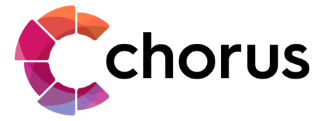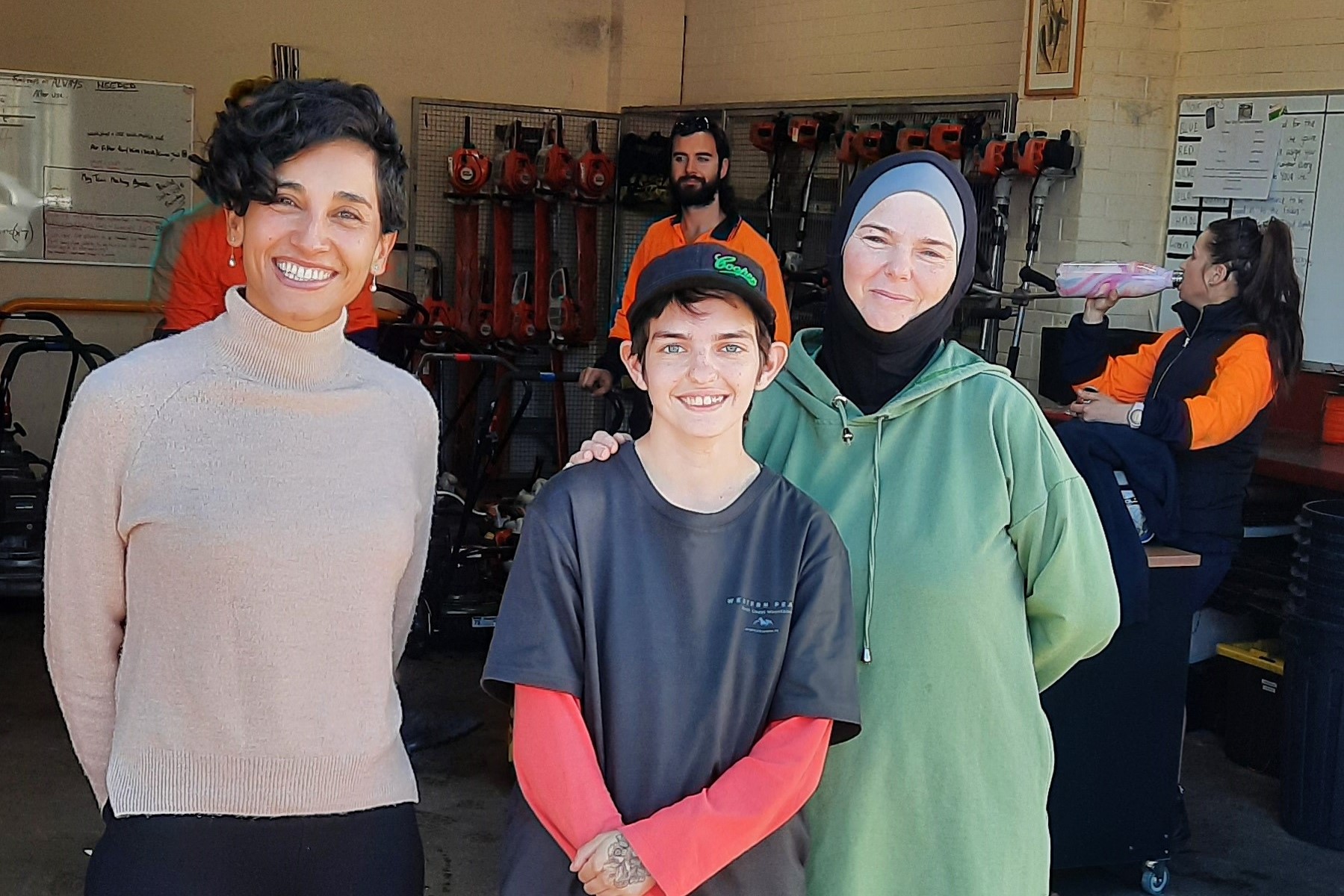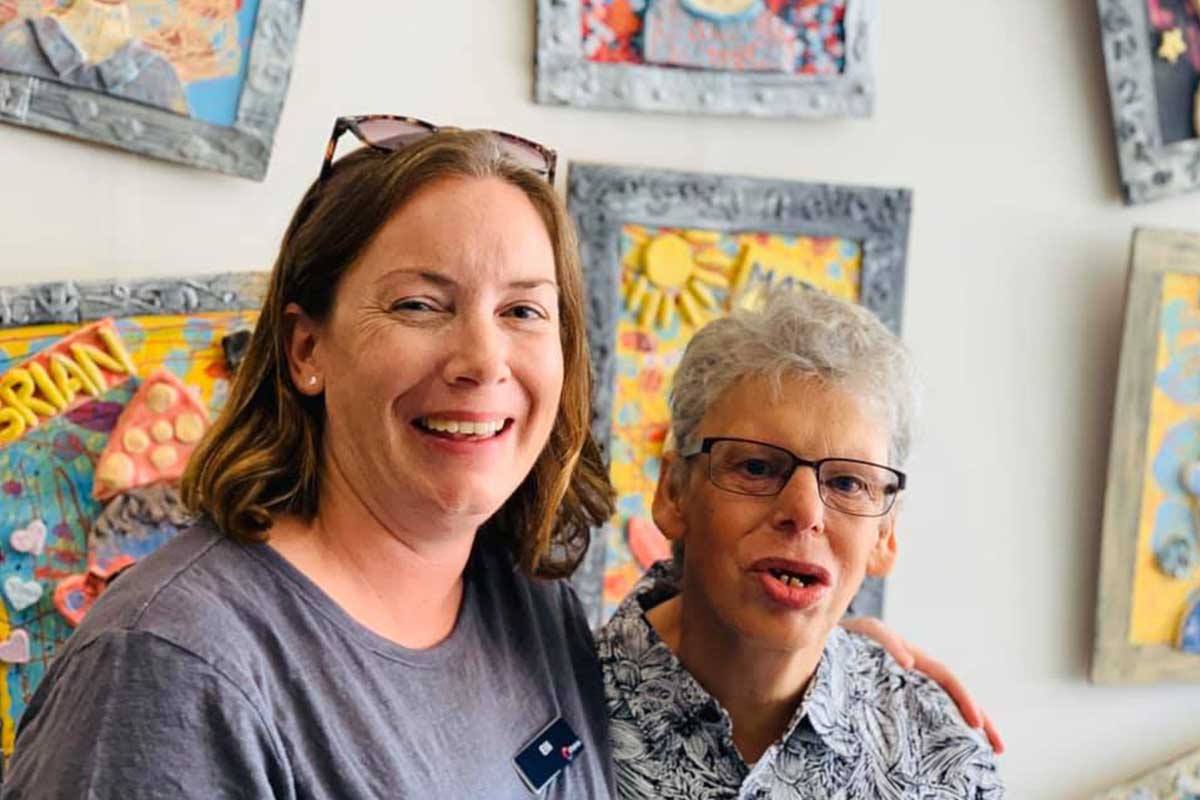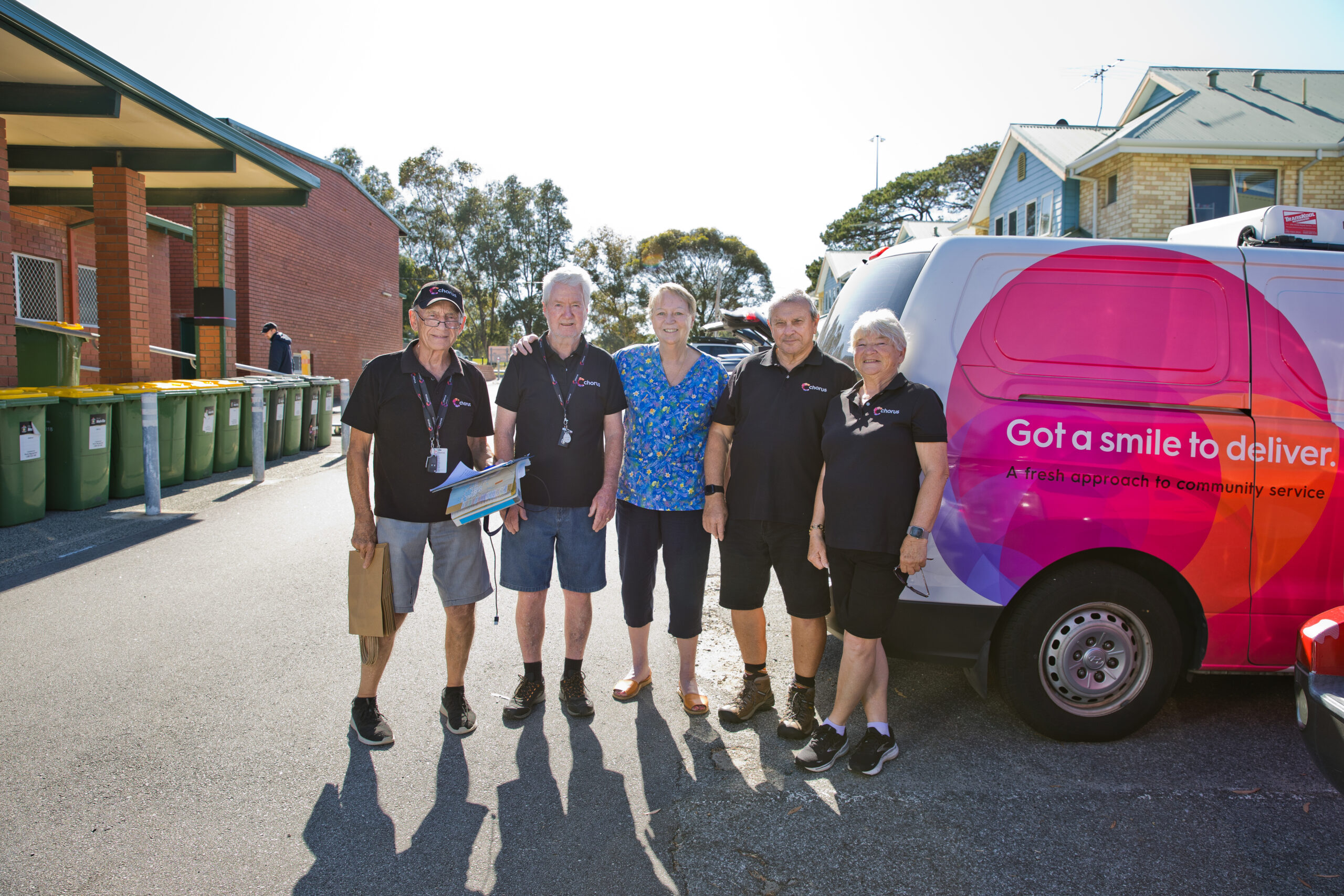Chorus CEO Dan Minchin’s monthly reflection on how we are putting the community back into community service.
August 2020
Chorus people are, almost without exception, kind. They prefer to work with and around people, and to foster meaningful relationships. They are deeply committed to improving the lives of others.
Which is what you would expect, given the nature of our work. During the week when I wrote this blog, the following exchange happened on Chorus Yammer. This sort of stuff happens all the time:
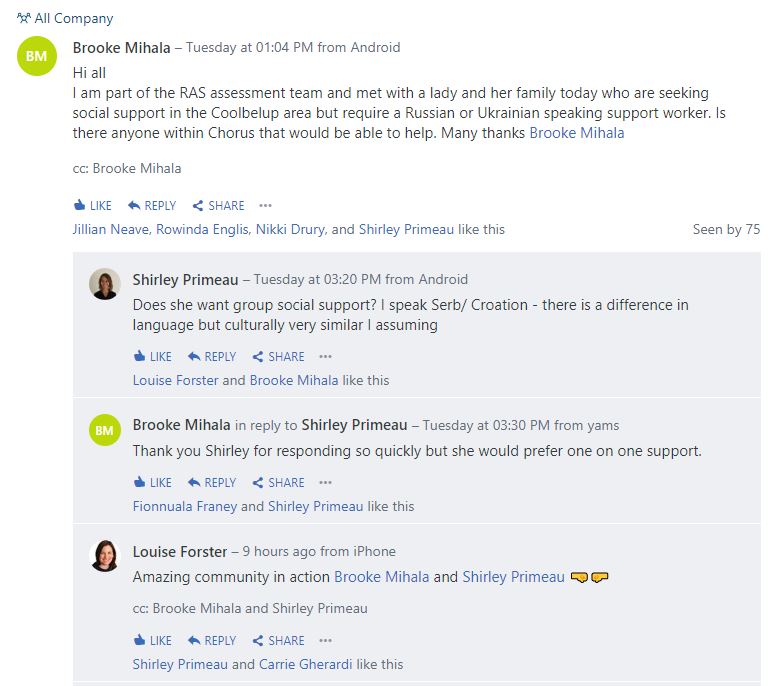
But the uncomfortable truth is that Chorus doesn’t exactly make it easy for people to be kind. In some cases, we make it downright difficult. The National and State systems within which we work don’t make it easy, either: the processes, reporting and rules for providing aged care, disability support and mental health concentrate on “the efficient delivery of inputs and outcomes, trapping us in the cultures and mechanisms of transaction and limiting human connection” ¹.
We are not alone in this; in fact, I would say most organisations make it difficult for people to do their best work. Our friends at Corporate Rebels, Pim and Joost, say that 85 per cent of employees feel disengaged, and 37 per cent believe their job makes no useful contribution to society ².
The culture at Chorus is substantially better than those global averages, but we still have heaps of room for improvement. And it’s important that we do! After all, we work with people needing support to live a good life.
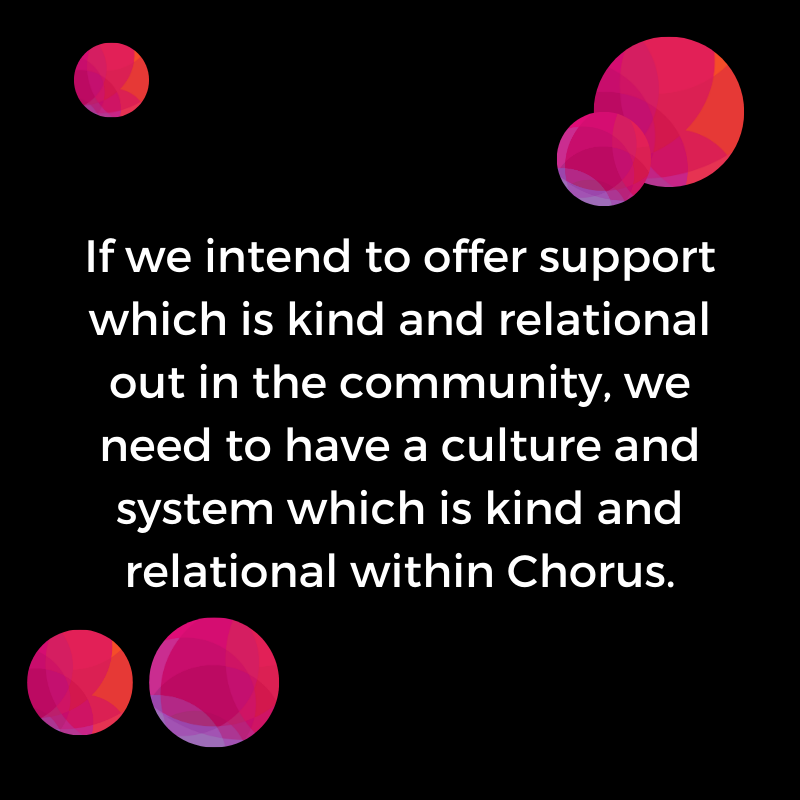
Removing barriers to kindness is one of the main goals of the Chorus fresh approach to community service. We are exploring, testing and implementing the changes necessary to support Chorus people to work more “relationally”: to reduce the amount of time spent on administration, reporting, driving and general wrangling with other parts of Chorus; and increase the time (and energy!) spent working with people, their families, their neighbourhoods and their lives.
As Charles Leadbeater and TACSI put it: “people need an intimate, human-crafted response – a relationship to rely upon, not a service that comes once a week” ³.
So, what will it take? In a nutshell, I believe that if we intend to offer support which is kind and relational out in the community, we need to have a culture and system which is kind and relational within Chorus.
In some senses, we are starting ahead of the pack. Like I said, Chorus is full of kind people who would prefer to be doing relational work. So we asked them, what would it take? They said:
- Teamwork and practices to nurture connection, support and relationships amongst peers;
- Freedom and flexibility to meet customer/community needs as they presented;
- Shared problem solving;
- Clear expectations and boundaries; and
- Supportive and simple processes, systems and leadership.
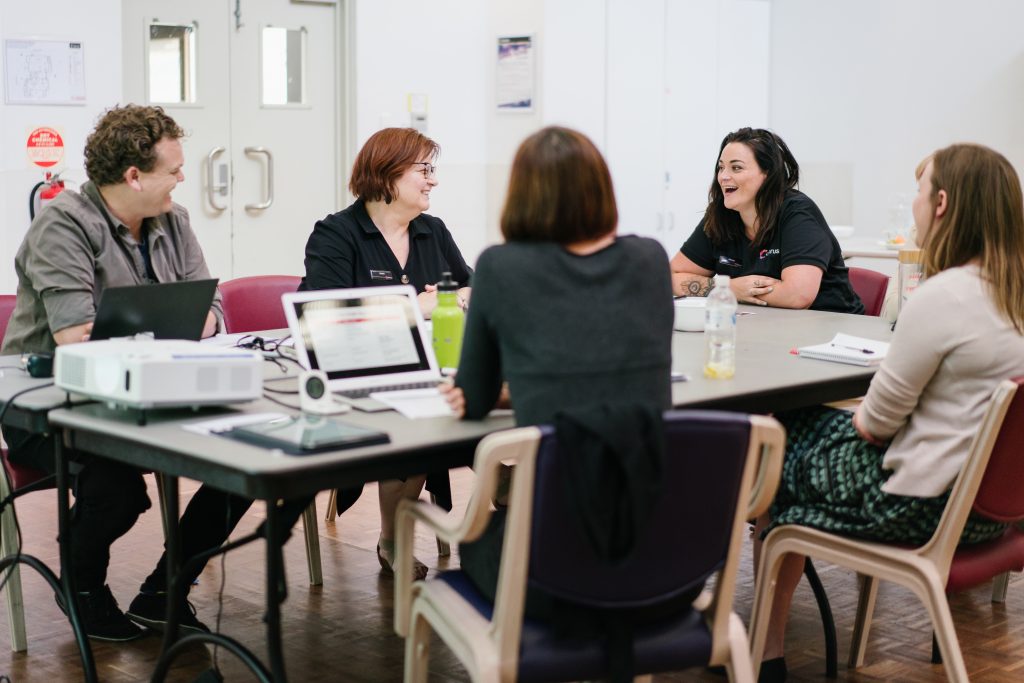 On the back of this feedback, the Fresh Approach program team have tested new ways of working, most notably regular “huddles”; usually short, virtual get-togethers intended to build connection and enable shared problem-solving. These huddles and other practices are designed to foster teamwork that sustains kindness.
On the back of this feedback, the Fresh Approach program team have tested new ways of working, most notably regular “huddles”; usually short, virtual get-togethers intended to build connection and enable shared problem-solving. These huddles and other practices are designed to foster teamwork that sustains kindness.
There is a fear that these practices and wider organisation changes will undermine our ability to deliver on the less human-sounding business objectives, such as financial performance, governance and program compliance. But I believe this is an entirely false dichotomy. In fact, teamwork doesn’t only sustain kindness; teamwork also sustains performance. A team that works together on shared goals can solve problems and realise opportunities that are entirely beyond any individual person, much less a business plan or process.
In addition, “kind” does not mean “nice”, and it certainly doesn’t mean “soft”. My experience as a leader at Chorus – as I said in this podcast – is that trying to be nice to people leads to poor relationships and a toxic culture. People cannot meet an expectation that has not be clearly stated.
Interestingly, this draws on the wisdom shared by many people in Chorus as to how they achieve their best results in supporting people to live a good life. The approach needs to be both kind and effective. Or, to channel Leadbeater and TACSI: both love and power.
And thus, the circle is completed: a kinder, more relational approach “out there”, depends on kinder, more relational approaches “in here”.
Of course, if this stuff were easy, everyone would be doing it. To encourage this sort of teamwork, to unlock kindness and performance, and to consistently nurture “relationships to rely on”, we need to change our organisation – and that’s the challenge we are now staring into. A lot of adjustment is needed to process, structure, technology and even physical location. Chorus needs to be simpler, expectations need to be clearer; space needs to be created for being as well as doing.
And underpinning that, we need to further evolve our culture. Most of us in Chorus have, over a lifetime of work, been programmed to operate a certain way; the change we need to make starts with every Chorus individual.
At Chorus, we are greatly inspired by the Dutch home nursing and care organisation Buurtzorg. Buurtzorg (the name means “neighbourhood care”) is a progressive organisation, with hundreds of small autonomous teams delivering high quality clinical care all over the Netherlands – and delivering strong financial performance and outstanding employee engagement. One of their mottos? Humanity, not bureaucracy.
